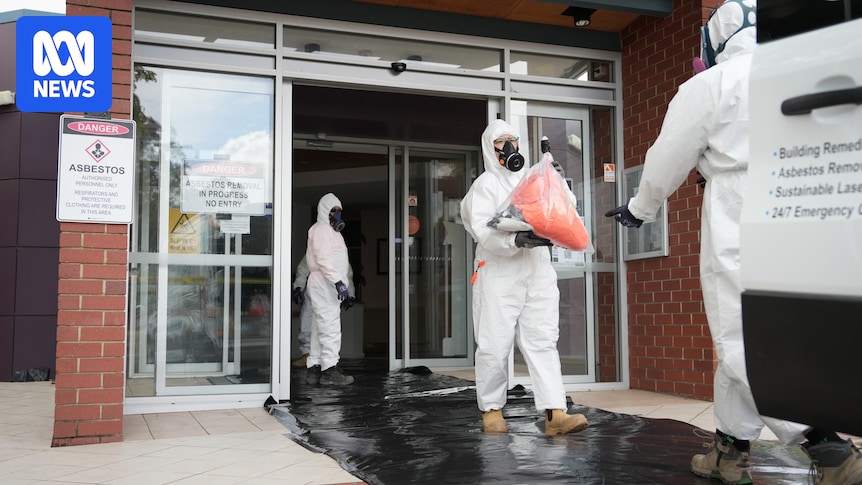While there’s a national recall for coloured sand products over asbestos contamination concerns, only the ACT has gone so far as to close public schools while it cleans up the products.
Nearly 70 Canberra schools are shut today after more coloured sand products were recalled over the weekend.
So why are schools closed in the ACT when other states and territories haven’t taken the same action?
Why has the ACT closed schools?
In a situation reminiscent of the COVID pandemic, the states and territories have gone their own way in handling the issue.
Last week, the Australian Competition and Consumer Commission (ACCC) issued a national recall notice for coloured sand products following laboratory testing that detected traces of chrysotile — a type of naturally occurring asbestos.
That prompted the ACT’s education department to close 16 schools and six preschools on Friday, and partially shut eight others, as it scrambled to conduct a search for the products.
ACT to close more schools over asbestos contamination scare
Over the weekend, Kmart and Target issued a product safety recall for four additional products.
That recall prompted the ACT government to shut 69 public schools today, putting it at odds not only with other jurisdictions but also with private and independent schools operating under the same legislation.
Education Minister Yvette Berry said the ACT’s laws around asbestos removal were “the most rigorous in the country”.
“We’re proud of that,” she said.
“I know it’s a small risk, however under the work, health and safety regulation we are required to eliminate the risk as far as reasonably practicable and that’s what we are doing,” she said.
“I can’t talk for or go through the legislation requirements under other states and territories.
“I understand the requirements of our legislation and those are the requirements that I’m meeting and that’s based on the advice that was first released by the ACCC around contaminated sand being identified.”
Schools are being assessed for asbestos across the ACT. (ABC News: Matt Roberts)
Under the ACT’s Work Health and Safety Act (2011), all asbestos removal work is required to be carried out by a licensed asbestos removalist.
“We need to have a certified asbestos assessor and contractor remove the contaminated sand and then provide a certificate to our schools that they are safe to return,” Ms Berry said.
Jo Wood says the directorate is taking every step to “prioritise safety”. (ABC News: Matt Roberts)
ACT Education Directorate director-general Jo Wood said the directorate was responsible for the safety of staff and students according to “very stringent work health and safety laws”.
“We are doing everything we can to be following every single step under our legislation, and ensuring we’re doing that in a really risk-assured way,” Ms Wood said.
“So I guess what I would say is people can have confidence that we’re really considering the risk and really taking every step to prioritise safety.”
Why are Catholic and independent schools open?
All employers within the ACT operate under the same legislation, including Catholic and independent schools.
Tracy Taylor, the executive director of Independent Schools ACT, said they had searched every school for the products and were “confident” they had acted appropriately.
“Out of our 18 schools, 11 of them confirmed they did not have any of the sand products on site,” Ms Taylor said.
“Seven of them found some small samples on site and they all did the right thing and got the licensed asbestos assessors in who disposed of any of the suspected contaminated products.”
Catholic Education issued a statement this morning saying it was working closely with the Education Directorate and health and safety authorities.
“We believe we have contained all the affected sand and the risk in our schools is still low,” the statement said.Why are schools open in other states and territories?
The ACT Education Directorate is alone in its decision to close schools, other than one independent school in Brisbane and another in Tasmania.
Since the products were recalled, officials and experts have said any asbestos found in the coloured sand posed a low health risk.
“It’s two things: it’s probably unlikely to become airborne, and the second is it’s really a very short-term exposure,” Professor Martyn Kirk from the ANU’s National Centre for Epidemiology and Population Health said.
“What we are worried about is when they breathe it in, not if they consume it.
“It’s very unlikely in something like sand that you’re going to get much in the air.”
In a social media post, Giant Steps Tasmania in Deloraine said the closure would allow staff to safely remove the product, deep clean classrooms and seek further advice from specialists.
More coloured sand products recalled
In South Australia, 139 sites have now been found to have the coloured sand, with independent contractors coming in to clean surfaces where the product has been loose.
In Western Australia, residents were urged to take precautions, including storing the products in sealed containers in a secure location. The government’s advice said not to dispose of the product but await further instruction.
The Queensland government has questioned how the Chinese-made products were allowed into the country.
“It’s important that people are given up-to-date information and also that there is a proper analysis on how this was imported and distributed,” Queensland Premier David Crisafulli said.
Victoria is undertaking an investigation with the importer and supplier of the sand products.
No NSW public schools have been closed.
As a precaution, a safety alert has been sent to all NSW public schools to immediately and safely remove the sand products, if present.
“The health, safety, and wellbeing of students, staff, and the school community is the department’s highest priority,” A NSW Department of Education spokesperson said.

